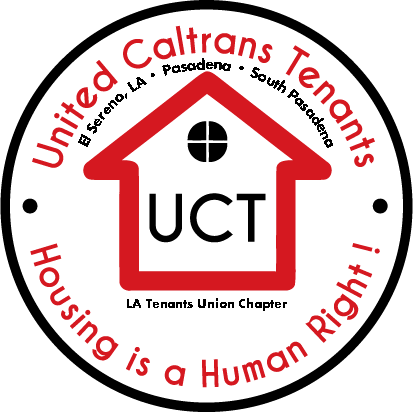
Open Letter to Caltrans and to Elected Officials
September 8, 2018
To the Following Elected Officials:
Laurie Berman, Caltrans Director
Jennifer Lowden, Caltrans, Right of Way Chief
Senator Anthony Portantino, from 25th Senate District,
Senator Kevin de Leon, Senator of the 24th Senate District
Maria Elena Durazo, Senator (to be) from the 24th Senate District
Assemblywoman Wendy Carrillo from the 51st State Assembly District,
Assemblyman Chris Holden, Assemblyman from the 41st Assembly District
Jose Huizar, City Councilman District 14
Eric Garcetti, Mayor of Los Angeles
Terry Tomek, Mayor of Pasadena
Richard Schneider, Mayor of South Pasadena
Shirley Choate, Caltrans, Interim District Director, District 7
Edward G. Brown, Governor of California
Residents and Renters of the 710 Corridor in El Sereno, Pasadena, South Pasadena and Neighbors
From: United Caltrans Tenants
Introduction
Beginning in the early 60s, Caltrans began buying homes in El Sereno, Pasadena and South Pasadena through imminent domain law which gives government the right to take private property for a public work. Between the early 60s and the late 80s nearly 500 homes were bought to make room for 710 Freeway. These purchases greatly damaged the communities, destroying their social and cultural fabric and people’s social networks, friends and families were torn apart. The neighborhoods fought back and demanded justice; some successfully resisted the sale and the surface freeway was eventually killed. Since 1979, the rentals and sales of those homes have been governed by the Roberti Law (GOVERNMENT CODE SECTION 54235-54238.7). The Roberti Law seems to be one of the last real reform bills that agreed with the plight of the people and truly had the interest of the poor and working-class communities in mind. The Roberti Law calls for mitigating the destruction done to the 3 communities by the 710 Plans and property purchases. The Roberti Bill recognized the need for low cost rentals and purchases and directs and instructs Caltrans to rent these homes at affordable rates. From the beginning Caltrans seemed to resent the responsibility and violated renters’ rights, harassed renters, neglected the homes, mismanaged funds, were found guilty of corruption, carried out vindictive evictions and on their own, without regard to the law, stopped their affordable program in an attempt to get rid of a program that they never wanted. All of these egregious acts let to a depopulation of the corridor. Over 120 homes are EMPTY, this during the worst housing crisis since the Great Depression! This Open Letter is a fast-forward to the present and addresses, in part, some of the most flagrant violation of, not only the letter, but the spirit of the Roberti Law and the continued depopulation and destruction of our communities.
There are many issues that we, tenants, are currently attempting to resolve with Caltrans. While there may be many more than listed here, the major current disputes with Caltrans can be placed into the following 5 categories:
- Maintenance Problems: Neglect and shoddy maintenance have resulted in slumlord conditions including, numerous health code and city habitability code violations. As one of the Caltrans workers pointed out anonymously, “every Caltrans house is in violation of the habitability codes.” Scandalously, The City of Los Angeles has given Caltrans an exemption on these violations and the other 2 city governments similarly prefer to look the other way.
- Rent Hikes: Rent hikes, up as high as 22% per year and no lower than 10%, continue to contribute to the depopulation of the 710 Corridor, and have put families in extreme financial jeopardy. Families especially impacted by these increases are those over 120% of the median area income, (over $58,200/year for an individual) as well those who qualify for the Affordable Rent Program (ARP), and yet are being denied the rent moratorium dictated by SB 400 (a bill authored by Senator Anthony Portantino in 2017 to stop rent hikes for Affordable Rent Program Participants).
- Home Sales Violations: Caltrans insists on violating its own sales policy, as well as the law, by not offering home sales prices at 25% of low income tenants’ incomes. Instead they have chosen to sell the homes for their original sales price, adjusted for inflation. This action effectively makes it impossible for some ARP families to purchase their home. Five of the 13 tenants that qualified are currently suing to have Caltrans follow the Roberti Law.
- Agent and Management Concerns: Agents are unable to provide adequate guidance or responses regarding the Affordable Rent Program. Moreover, Agents seem to be trained to harass and antagonize tenants. It’s been reported to UCT, that when agents conduct their yearly inspection, it appears that they are looking for reasons to evict tenants, rather than take the opportunity to advocate for much needed repairs. This has resulted in unjust evictions. Tenants face intimidation, and fear retribution, if they seek redress or express their concern. Tenants feel they would face arbitrary eviction if they contest the actions of the Caltrans Agents.
- The Illegal and Immoral 2012 Policy: With its 2012 Policy, we believe Caltrans is abandoning its responsibility to rent and sell homes at affordable rates as directed by the Roberti Law. This policy of not renting affordable, hurts tenants that rented after Dec. 31, 2012; makes them not eligible to adjust their rent into affordable if they experience a layoff, or fall into economic hardship. Lastly, this policy contributes to depopulation of the corridor.
Depopulation is the Overall Result and Pattern
The impact of these issues result in tenants being forced to move or being forcibly moved through the violence of eviction. All these issues have resulted in what many of the tenants identify as a gradual but calculated, “depopulation” of the corridor. Based on the facts, we conclude that depopulation of the corridor is, in fact, Caltrans’ unwritten and main desired goal. While Caltrans’ hidden goals may be debatable, Caltrans’ actions, and the resulting impacts are not. Upon review of the objective facts, anyone can see a clear pattern of depopulation. It has been reported that several Caltrans employees have verbally informed tenants that the reason Caltrans does not want to rent affordable, is because, it would much rather sell the homes at market rate or to non-profits for a higher price than to the current tenants, that would otherwise qualify to purchase for an affordable rate. Depopulation is the goal, the means and the result.
For instance, the 2012 policy, which allows Caltrans to stop renting affordable, serves the aims of depopulation quite well. This open letter is a call to action to resolve each of the issues discussed, but it is especially focused on the demand to immediately remove the 2012 policy.
In the past, Anthony Portantino and staff, in particular Kristi Lopez have worked hard to defend the rights of Caltrans tenants. We appreciate the Senator’s advocacy in stopping the dangerous and costly 710 tunnel plans. The Senator and Kristi have also successfully legislated on our behalf not once, but twice. The Senator introduced and successfully passed SB 400, which set a moratorium on all rent hikes for those tenants that qualify for the Affordable Rent Program (ARP). [1]Yet the result of SB 400, while well intentioned, has fallen short of its purpose. Portantino initially called for a moratorium on all tenant rent hikes, however Governor Brown’s office communicated that the Governor would not sign that bill unless amended to exclude everyone other than Affordable Rent Program Participants. Portantino and staff also introduced and successfully passed SB 275, which allowed the tenants’ taxes on an affordable purchase to be based on the affordable sales price and not on the market price, which Caltrans had originally intended. Our difference on what to do with the 2012 policy is not an attack on all the good work that has been accomplished so far, but it’s a critique of any position that would defend Caltrans’ action/policy to stop the affordable rent program before the home sales are completed. Any defense of the 2012 policy essentially supports Caltrans’ overall immoral exit approach to the Affordable Rent Program and its continued violation of the law.
What is the 2012 Policy?
The 2012 policy prohibits any tenant who rented after 2012 from qualifying for the Affordable Rent Program, even if they meet all income and eligibility guidelines. The 2012 Policy defines eligible tenants as:
[Only those] “Tenants who are in occupancy as of December 31, 2012, who are not eligible for the Relocation Assistant Program and that have an annual income not exceeding 120% of the LA County median income” (California Title 2, Public Works Division 2, Department of Transportation, Chapter 24, Right of Way, Sect 2655, Can also be found in Caltrans Right of Way Manual, Chapter 11, pp 136-139).
Through this 2012 policy, Caltrans’ decision to stop renting affordable as of January 1, 2013, without authority modifies and violates the Roberti Bill. The 2012 policy is a direct result of the local District 7 Caltrans not following Sacramento’s policies regarding renting all available properties to maximize potential state revenue. Therefore the 2012 policy is also a rogue policy, directly violating the interests of the State of California.
Why is the 2012 Policy morally wrong?
Los Angeles and California are experiencing a severe crisis of limited availability of housing and homelessness. Los Angeles accounts for 10% of the total United States population, but is home to 25% of all people experiencing homelessness. The rise of rents is astronomical and increasingly out of reach for thousands. The streets, cars and medians in El Sereno and Pasadena are becoming inadequate shelters for an increasing number of families and individuals. As Caltrans refuses to rent out its surplus real property and continues to take action to depopulate the corridor through rent increases and evictions, clearly its actions are exacerbating the housing and homeless crisis.
Why is the 2012 Policy legally wrong?
Ironically, the preamble of the 2012 Policy paraphrases the Roberti Law, stating:
“The California Legislature has declared the availability of the affordable residential housing is of vital statewide importance and state agencies, including the Department of Transportation, have a responsibility to use the power vested in them to meet the housing needs of all economic segments of the community. Accordingly, the Department sets forth herein the Affordable Rent Program by which the Department can consider affordability when adjusting rents for current residential tenants who are economically disadvantaged. The Affordable Rent Program is intended to protect existing low-income tenants from the large rental rate increases, which may otherwise result in their current rental unit becoming unaffordable.”
The above is the correct policy Caltrans should carry out. However, in contrast and in contradiction to what has been previously cited, Caltrans awkwardly, adds:
“For new tenants, rents will be set at fair market rates.” (Introduction, California Title 21 Public Works Division 2, Department of Transportation Chapter 24, Right of Way, Sect 2655, Can also be found in Caltrans Right of Way Manual, Chapter 11, pp 136-139).
In a discussion with Senator Portantino at one of our UCT meetings, when asked what he could/would do to assist in the elimination of the 2012 policy, he stated something to the effect that Caltrans was within their right to terminate the Affordable Rent Program and draw the line somewhere. We are vehemently opposed to this position. Caltrans has a right, a need, and a legal mandate to terminate the Affordable Rent Program (ARP), not by violating the Roberti Law, but instead, by terminating the ARP only after all the homes are sold. The Roberti Law, in fact, is specific, thorough and comprehensive about the exit strategy. When Caltrans sell the homes, their contract with those homes is terminated. After the homes are sold, Caltrans has no further relationship to those homes. When they sell the homes, Caltrans has ended their obligation to those homes, and fully fulfilled the mandate and mission of the Roberti Law. The Roberti Law says rent, then sell, not depopulate and destroy! The law provides a bright line of demarcation here.
What do we expect officials to do?
UCT asks that all elected officials persuade Caltrans to eliminate the 2012 Policy on the basis that it is an unacceptable, illegal and immoral exit strategy. We also ask that elected officials clarify to Caltrans that the only acceptable exit strategy is already spelled out in the Roberti Law; rent, then sell the affordable homes to all that qualify particularly former tenants who were either pressured out or unjustifiably evicted. We also expect elected officials to work together to institute an immediate and effective moratorium on the rent increases for all Caltrans tenants, regardless of income, to avoid depopulation of the corridor prior to the homes sales.
What do we expect the tenants to do?
UCT is asking tenants and neighbors to 1) sign this open letter, 2) become advocates or continue to advocate for one another regarding the issues outlined in this letter, and 3) pressure their elected officials to take immediate action to eliminate the 2012 policy by renting all the empty houses, opening up the affordable program for all qualified tenants, and address all the other issues affecting Caltrans tenants discussed in this letter.
Conclusion
We, the United Caltrans Tenants affirm that Caltrans is abdicating its duties outlined by the Roberti Law; to rent occupied homes and surplus property at affordable rates. Furthermore, the 2012 policy is not a lawful and moral exit strategy. The 2012 policy is evidence that Caltrans is taking the path of least resistance by trying to depopulate the corridor. Because of this, there are over 100 empty homes along the corridor; 37 just in the area south of Huntington Drive. Far from mitigating the harm done to these communities, as mandated by the Roberti Law, Caltrans is once again destroying our communities through depopulation.
Since these homes remain empty, Caltrans will now have the opportunity to sell these empty homes at market rate. We are all witnesses! Through depopulation, and limiting the housing supply, Caltrans has fueled the major gentrification we are experiencing within our communities. Depopulation, destruction and gentrification of community is not only in violation of California Law, but also in violation of International Law.
Please sign our change.org petition to stand in solidarity with United Caltrans Tenants https://chn.ge/2MXQte9
In Solidarity with Our Communities,
United Caltrans Tenants (Local Chapter of the Los Angeles Tenants Union)
“Housing is a Human Right”
EMAIL: UnitedCaltransTenantsInfo@gmail.com
www.UnitedCaltransTenants.com
[1] Caltrans’ response to SB 400 has been to obfuscate the application process and create additional institutional barriers for qualifying. Enforcement on the moratorium for ARP tenants has been inconsistent. UTC has had to step in and act like liaisons or ombudspersons to support tenants in the ARP application process. For example, there is no clear policy on how and when to apply for the affordable rent program, nor are there clear guidelines on what documentation is required from each tenant. The application and request for documentation that is sent to tenants is vague and cumbersome, which can be extremely intimidating and overwhelming for tenants. Moreover, when tenants do submit their completed applications, there is no clear expected response time to find out from Caltrans if they’ve actually been approved or not.
Exacerbating this is the fact that on many occasions, tenants never received a response yet their rent continued to rise or they were told that more documentation, that was initially never requested, must now be submitted for consideration for the affordable rent program. This is akin to unjustifiably upping the ante, especially since Caltrans has ignored rent increase moratorium requests from tenants who need more time to submit the additional documentation Caltrans has requested.
These Caltrans actions equate to a flagrant violation of the affordable rent program effectively nullifying SB 400. Tenants are angry and frustrated by the Agency’s inconsistency and lack of accountability. Caltrans also continues to flout state California state law by refusing to provide monthly rental bills to all tenants, making it impossible for tenants to know if they are being charged additional late fees. This effectively violates the Consumer Protection Laws.
[This letter was submitted to SouthPasadenan.com News for Publication by United Caltrans Tenants (Local Chapter of the Los Angeles Tenants Union)]















.png)










